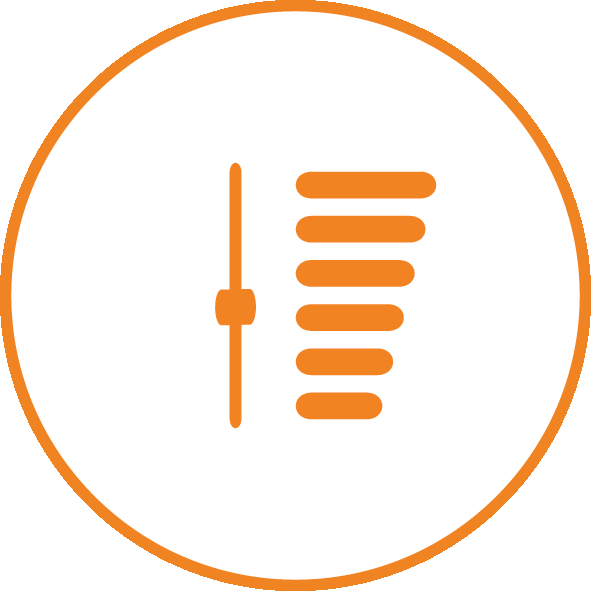SAMI – FOR PERFORMERS
If you have performed on recorded music you are entitled to remuneration when your music is played in public. Join SAMI and register your recordings. We collect the remuneration for you when your music is played in business premises, on radio, TV and the internet.
This is how it works

When you join SAMI
When you join SAMI and register your recording lists, we make sure that you get paid for your work, in Sweden as well as abroad. As a member you also get access to My SAMI. There you can watch and edit your discography, you also find detailed information about your payments and other important information that concerns you. Make sure your bank details and contact information is up to date so we can disburse your money.

Register your recordings
The recording list is the foundation for your remuneration. It proves who performed on the recording and what role everyone had (e.g. musician, conductor or solo artist). With correct recording lists in our database, we know exactly who to pay when music is played in public, and how much. But for some recording lists we need more information to be able to pay the performers – check out our list of incomplete recordings →

We work for you
When your music is played in public, SAMI is there to collect your remuneration, from various Swedish businesses such as shops, gyms, hotels and restaurants, as well as from radio and television. But we also collect your money all over the world through our bilateral agreements with collecting societies in other countries. We then distribute the remuneration, making disbursements four times a year.

Member with voting rights
Everyone who has participated in a recording can join SAMI, but if you also want to be able to vote at SAMI’s general meeting, you must be a member with voting rights. Anyone who is a member of SAMI and has received two SAMI payments, has the right to apply for a membership with voting rights. If you meet the requirements please contact our Member Service for more information.
Advanced questions
Inheritance of rights
A recording is protected for 70 years from the year the recording was made. If the performer dies before the end of the term of protection, the heirs are entitled to the remuneration. In order for us to pay remuneration to heirs, the right of inheritance must first be proven. This is done by submitting a copy of a registered estate register. In cases where there is more than one heir, we also need a succession document. The document must be signed by all the owners of the estate.
Please contact our Member Service if you need more information
Claims and complaints procedure
At SAMI, we strive for high quality in everything we do. Nevertheless, a situation may arise where you as a rights holder has a complaint. You can file a claim or complaint to SAMI if you believe:
- that a recording is incorrectly documented by SAMI
- the remuneration you received is incorrect or is missing
- we do not manage our administration in accordance with law or established regulations
Read more about our Claims and complaints procedure
Limitation of SAMI's mission
When you join SAMI, all collection areas and rights categories within our administrative area are automatically covered, in all countries where we have agreements. According to our statutes, you can limit SAMI’s assignments by excluding one or more countries, or in a certain way limit the areas of use that are otherwise covered by our administration. Even in the event of a restriction, a six-month notice period applies (counting from SAMI’s receiving date) before the limitation comes into effect.
Log in to My SAMI to manage your settings
Q&A
How much money do I get when my song is played on the radio?
Your remuneration is calculated from several factors such as role codes, number of minutes played and the total amount of money SAMI collected during the year. Therefore we cannot say, or even guess, in advance how much money you will get for your song. It depends on how much your song has been played and how much money we can collect.
How do you know which music has been played?
We regularly receive play reports from radio and television about what music is played in their channels. We also receive reports from DJs all over the country, showing what is being played at discos and nightclubs. The Swedish Authors’ Fund (Författarfonden) also provides us with information about which phonograms have been lent out at Swedish libraries.
But if every single business that plays music at their premises would report every single song to us, there would be unmanageable amounts of data to handle, for them and for us. Instead, we ask the research institute SIFO to conduct a survey for us every year. This gives us the general information on what is being played in public all over the country. When we know what music they play in, for example, shops, restaurants, hotels and gyms, we add this information to the rest of our play reports. Together, all these sources give us a pretty good picture of what music has been played and helps us distribute the collected remuneration as fairly as possible.
I have millions of streams on Spotify. Where is my money?
As the legislation stands today, SAMI has no rights to collect for either Spotify, YouTube or any other streaming services. Therefore we can neither collect money nor play reports for music streaming. Our department for public affairs is working to influence politicians and decision-makers and we hope to see changes in the legislation in the future.
What is an ISRC code?
ISRC is an abbreviation for International Standard Recording Code. An ISRC code is a unique code that all recordings must be provided with, much like a social security number. The code enables the identification of songs and a song always retains the same code even if it is reused on, for example, a compilation album. If the song is re-recorded, this is counted as a new recording and given a new ISRC number.
The ISRC code follows an international standard consisting of twelve letters and numbers in combination. It consists of twelve alphanumeric characters that identify:
• Country of origin for rightholders
• Company code
• Recording year
• Recording number and track identity
I found an error on a submitted recording list. What do I do now?
Contact our Member Services and tell us which song or album it is and what went wrong, and we will help you correct it. After the recording list has been submitted, you can only make certain additions, you do this inside your discography on My Pages. You can add more participants to a song, add ISRC code or song length if this information is missing.
Is it too late to report a song from 2017?
SAMI has a ten-year statute of limitations for songs played in Sweden, so you can definitely submit recording lists for ”old” songs.
Collecting societies in other countries, however, have their own rules and the limitation period is often between three and five years. This means that you can get the Swedish remuneration for an ”old” song if it has been played, but that the opportunity to claim your remuneration from other countries may be lost.
How do I report a song recorded outside of Sweden?
If you have performed on a recording abroad, you must ensure that we receive documentation that confirms this in order to be able to collect your remuneration. In order for us to claim your remuneration from other collecting societies, we need as much information as possible about the recording.
You need to fill in a form for recording abroad and take a copy of the cover to prove you are performing on the recording. Send us an email with the information, and if you have any further questions on the topic, please contacts us at medlemsservice@sami.se
Do I have the right to vote at SAMI’s general meeting?
Anyone who has participated in a recording can join SAMI. If you also want to become a member with voting rights at SAMI’s general meeting, you need to apply for this separately.
To become a member with voting rights you need to be a SAMI member and have received at least two remuneration payouts from us. You must also be the holder of the rights yourself. This means you can not become a member with voting rights if you for example only have inherited rights.
If you meet these requirements, you are welcome to apply by sending us a written application, signed and witnessed, by post. Decisions on membership with voting rights are made by the board at the next board meeting.
What does limiting SAMI’s mission entail?
When you join SAMI, we automatically collect your compensation from all areas and all countries with which we have agreements. If you want another collecting society to handle part of the fundraising, you have the right to limit our assignment by opting out of certain fundraising areas or countries.
• Collection areas
There is only one specific area that you can opt out of our assignment: your exclusive rights for on demand and copying. At the present, no money is collected for this area, as there is no support for it in Swedish legislation. But we are working to change that – and your chances of receiving remuneration for this type of music use are greater if the assignment remains with us. In some countries (e.g. Spain), artists and musicians are already entitled to compensation for on-demand services (such as Spotify, Apple Music). As a SAMI member you receive this compensation via SAMI’s exchange agreement.
• Countries
You can also limit in which countries we collect your compensation. If you do this, you must make sure that you are affiliated with a collecting society in that country and have direct contact with them. However, SAMI is one of the collecting societies that has the most exchange agreements in the world. We put a lot of effort into ensuring that they are actually complied with and generate money for our affiliates. All foreign compensation is also paid directly to you without us making any administrative deductions.
How do I resign from SAMI?
If you no longer want us to collect the remuneration for your songs, you can resign from SAMI. You must terminate your agreement in writing. We apply a notice period of six months and the notice is calculated from the date it arrives to us.




